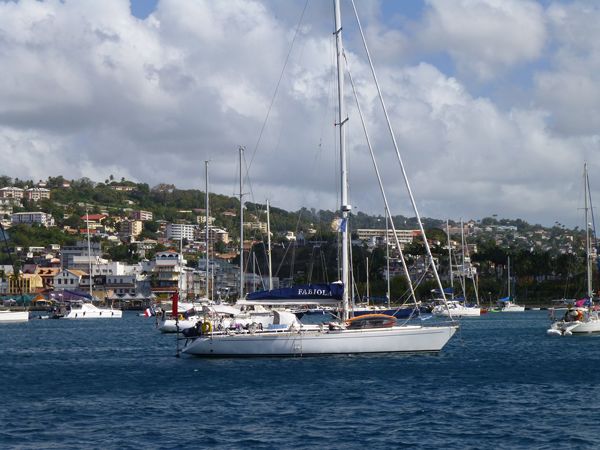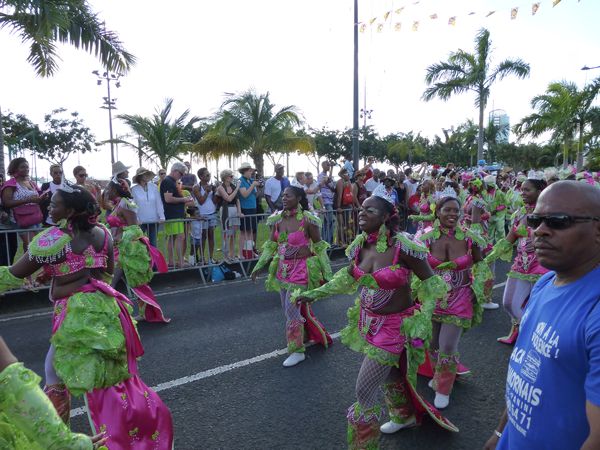It is the third day of the carnival in Martinique and hundreds of thousands of people have descended on the capital of Fort de France from all over the island to join in the chaos. Every single person, without exception, is dressed in a combination of red and black; the girls in corsets or bandeau tops and micro skirts, some with tails, others with devils horns and tridents. The men also dress as women, incongruous in short sequined tutus and ripped tights, with ghoulish masks or small parasols to complete the extraordinary get up. The satanic costumes heighten the sense of drama and intrigue that pervades the streets and we are caught up in the spell as darkness falls. We feel conspicuous in our shorts and T shirts so we return to the boats and dress up for the occasion, Gill making a supreme but unsuccessful effort to blend in when he bravely appears in a red dress with matching nail varnish and lipstick.
The carnival started in earnest last Sunday and we anchored off the town of Fort de France with our friends from Fabiola; Gill and Lisa Duncan with their two charming boys, Cameron and Samuel. We dinghy the short distance from the anchorage under Fort Louis to the most impressive dinghy dock we have ever seen on the edge of town and only yards from where the carnival procession will pass. It is three in the afternoon and the glaring sun brings the temperature up to 38 degrees as the wind drops and the crowd waits in hot suspense. We are surprised to see the spectators entering into the spirit of the occasion and most people are in fancy dress; some as playboy bunnies, men in short skirts with bared chests and some very well fed ladies who seem uninhibited by rolls of flesh bulging over fluorescent hot pants and tight sparkly tops that simply aren't engineered to contain the swell of their contents.
We hear the sound of the drums as the crowd pushes up against the railings, necks craned to catch sight of the leading band. Showing that age is no barrier to carnival, a group of elderly ladies, beautifully made up with painted faces and dressed in elegant costumes, sashay down the street, clearly enjoying the attention as they dance ahead of the band, their footwork deft and precise and their bodies controlled by the rhythm of the drums. At the other end of the scale a young girl of maybe six years old in gold shorts and matching ballet pumps holds centre stage among her older companions with complete confidence and the same provocative wriggle of her small bottom. Band after band drifts past us, each with a different theme, some rehearsed and beautifully dressed, while others seem to have slipped by the organisers into the procession, among them a group of hairy men in drag, clutching hand bags and smoking reefers as they stagger down the street in size ten high heels.
The carnival runs for 5 whole days on the island of Martinque and during this time the shops and restaurants are shut and food and drink is served on the pavements by street vendors. It is a great experience to be here and despite the noise, alcohol, and the dubious smelling cigarettes we see no policeman and not a sign of any rowdy behaviour. It is the magic of carnival.
For some weeks we have been trying to meet up with Fabiola and after many text messages between Fatty and Lisa we manage to rendezvous at the anchorage of St Anne a week before the carnival. We spend a few days at St Anne, with barbecues on board and swimming at the beach at Les Salines, then sail the short trip around the point to Anse D'arlet a small village on the west coast. It is a delightful spot and as we dive to check our anchors in 10 metres of water, Gill and I see two large sea turtles paddling along the bottom, chewing on sea weeds in apparent happy companionship and oblivious to us floating 5 metres above their scrawny heads. The following day is Sunday so we motor across the huge Baie de Fort de France and drop anchor next to Fabiola under the ramparts of Fort Louis.
We share a rented car with Fabiola and tour the island, visiting the town of St Pierre which lies at the foot of Mt Pelee, not far from where European settlers wiped out the last of the Carib residents in 1658. It is said in Chris Doyle's eponymous guide book that before the last Caribs died they uttered horrible curses, invoking the mountain to take its revenge, and on the 8th of May 1902 the volcano erupted and destroyed the town, killing 30,000 inhabitants and wiping out the fleet anchored in the bay. Having once been known as the Paris of the Caribbean, St Pierre is now a sleepy little fishing town, its museum depicting the extent of the devastation caused by the eruption which released more energy than the atomic bombs of Hiroshima and Nagasaki combined.
Sitting at a small restaurant on the Atlantic coast we chat with a man at our neighbouring table. He tells us that he is in the French anti-drugs squad based in Guadeloupe, and his job is to be the eyes and ears of the service, looking out for potential traffickers from the anonymity of his holiday garb. Gill, who is a Major in the Royal Marines, is soon having an animated discussion with this man, but his credibility is slightly undermined when Lisa nudges Caroline and points out that he still has some mascara on his eye lashes form the previous night's fancy dress. We wonder if our friendly policeman was too polite to comment or whether he simply didn't notice, so keen was he to demonstrate, complete with sounds effects, how he shoots at drug smugglers from his helicopter, funded by the French tax payer.
As we have to be in Antigua by the end of February we say good bye to Fabiola for now and weigh anchor, our next destination is Dominica, then Guadeloupe.












































So not too dull out there then, Frewy...
ReplyDeleteN
....tops that aren't engineered to contain the swell of their contents.....never heard it put like that before!!
ReplyDeletePaul